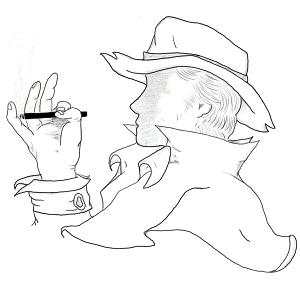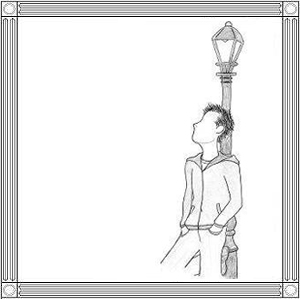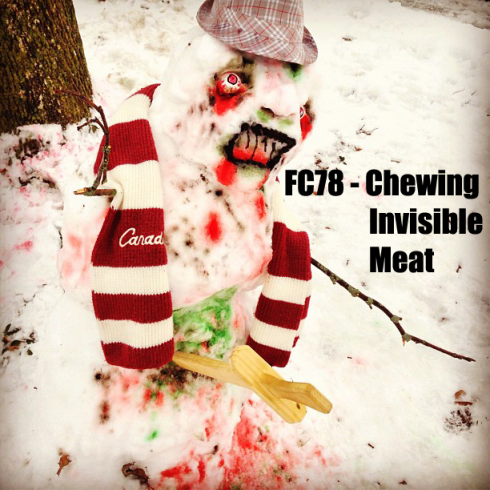FP447 – The Murder Plague: Turnabout, Part 1 of 2
Welcome to Flash Pulp, episode four hundred and forty-seven.
Tonight we present The Murder Plague: Turnabout, Part 1 of 2
[audio:http://traffic.libsyn.com/skinner/FlashPulp447.mp3]Download MP3
This week’s episodes are brought to you by Nutty Bites!
Flash Pulp is an experiment in broadcasting fresh pulp stories in the modern age – three to ten minutes of fiction brought to you Monday, Wednesday and Friday evenings.
Tonight we return to Capital City where Harm Carter, father and former military man, has been contending with the homicidal paranoia inducing illness that is The Murder Plague.
The Murder Plague: Turnabout, Part 1 of 2
Written by J.R.D. Skinner
Art and Narration by Opopanax
and Audio produced by Jessica May
Here’s the thing about Hitchcock’s. Even as an incredibly sick, sometimes feverish, death-dispensing maniac, you are absolutely convinced that you are the only person on this planet-sized carousel who truly has their situation under control.
You’re hiding in an attic, and you’ve got scraps of paper pinned up on every surface. You spend your days with a flashlight – red filtered, as looted from the home of the dead or fled survivalist down the road – scanning the sheets of paper you’ve pinned to the insulation and roof beams. You’re using the red filter because it’s less noticeable than a white glow, despite the fact that it’s broad daylight outside and there are no windows in your attic.
You trace and retrace the colour-coded dots and scratches you’ve drawn, with pencils stolen from an abandoned school bag, and though the mess of lines and circles has begun to blur and smudge, though the heat has you sweating like a drug mule getting ready for an intercontinental flight, though you keep chuckling to no one but yourself, you feel like the king.
No one, you convince yourself, will ever break the code you’ve used to map out your routes, caches, and traps. No one, surely, could ever come up with such a clever system without leaving a hint or trail. No one is as smart, as careful, as PREPARED, as you are.
At night the only thing you hold closer than the section of map you’ll need for that evening’s expedition is the handgun you plan on using to defend your secrets.
Jokes on you, of course, because the neighbourhood you consider your kingdom is infested with plenty of other fools who also think they’re royalty.
 Sometimes the attacks are straight forward, and your survival, if you could admit it to yourself, is just luck. A gunshot rings out and you tell yourself you’ve escaped unharmed because you’re too fast to hit. A large woman with a machete and silent feet does her best Queen of Hearts imitation, and you tell yourself you’ve avoided the grave by knowing to bring a gun to a knife fight. Invaders break into your sanctuary while you are away, and you convince yourself that you’ve defeated the ambush they set by having left semi-hidden rat-poisoned food about the lower floors – and never mind that they might have waited till safely home to snack.
Sometimes the attacks are straight forward, and your survival, if you could admit it to yourself, is just luck. A gunshot rings out and you tell yourself you’ve escaped unharmed because you’re too fast to hit. A large woman with a machete and silent feet does her best Queen of Hearts imitation, and you tell yourself you’ve avoided the grave by knowing to bring a gun to a knife fight. Invaders break into your sanctuary while you are away, and you convince yourself that you’ve defeated the ambush they set by having left semi-hidden rat-poisoned food about the lower floors – and never mind that they might have waited till safely home to snack.
At some point, just before another dateless dawn, you’re almost done scratching Xs across the hand drawn chart of places you’ve cleared out for supplies, and, as you’re tugging at a garage door in search of gasoline or sharp-edged tools, you nearly get taken out by a log trap. A dozen trees, which you’ll later realized were stripped from a local schoolyard before being piled high in the quiet darkness, come rolling at you, and you damn near have your knees snapped backwards and your rib cage trampled by tumbling pines before you can leap left. Lobbing a Molotov onto the roof you wait till the attempted murderer stumbles from his haven and you end the wannabe Boy Scout with your pistol. You don’t think twice about having slain a frumpy man in a Star Wars t-shirt and thick-rimmed glasses. You don’t think twice about the pencil smudges on his fingers. You don’t think twice about the red-filtered flashlight he happens to be carrying.
You simply collect what you can use, shrug at the death of another challenger to the crown, and move on.
I – I simply collect what I can use. I simply shrug at the death of another challenger to the crown. I move on.
In the end the hardest aspect of the Murder Plague is not dealing with the corpses, traps, and scenes of violence, it’s in knowing that it was not some other carrying out these actions. I was not some passive observer staring at my hands as they locked around a stranger’s neck. It’s your fingers, your palms, your squeezing and struggling against the final jerks and snorts and twitches – but you have no control.
Maybe a week and a half after nearly being rolled flat like the Pillsbury Doughboy cornered by the Swedish Chef, I was creeping along one of the zig-zag paths I used to return to my shelter when I caught sight of something unusual: A dog barking.
Oh, my paranoia about the feral packs roaming the neighbourhood was already long standing – Were they being trained and controlled by someone else? Would they rush me for my supplies? Could the plague itself affect them? – but generally we’d had an understanding familiar to elevator passengers in a more civilized time: I pretended they didn’t exist, and they pretended I didn’t either.
The thing was, this mutt, a little Yorkshire Terrier that could have used a bath and a seven course meal, was yapping and yapping and yapping at the red door across the street. Now, it was a very quiet time. The sound of gunfire was increasingly distant, probably due to a decreasing population of people to shoot at, and the car engines were rare. There were no songs wafting through the air from a distant block, there were no trash talkers playing basketball on some other street, there were no couples arguing about dinner, the kids, or the bills. Any noise could get you killed, so every noise was suspect.
Yet here was this pooch yammering his heart out.
Given how many real humans I ended in my haze, it’s still strange that I’m struck by shame when I admit that I almost killed him. I was worried about his drawing attention, and my infected mind was so survival focused that it was already formulating the argument that I could use the extra meat.
Never mind that I had six months worth of cans already stacked in the attic, and another couple years’ worth scattered in holes at all corners of my hand-sketched map.
I stepped forward and reached into my right pocket for my tanto-bladed pocket knife. I raised my boot with the intention of pinning the fur ball down beneath the thick sole while I conducted my butchery.
The red door flew open and a bloody one-person SWAT team burst through the opening. The dog sprinted away under the gate to my right and my pistol was in my grip before I even had both feet back on the ground. This wasn’t just some slovenly gun fetishist buying equipment online before the collapse, however: I knew this armour. This wasn’t some hillbilly in a gas mask, this was someone who’d been bestowed the tinted bubble helmet and face mask the military had developed to deal with improvised explosives and ravenous undead.
I got one shot off, which landed with a flat thwack and little other effect, but the mountain of black tactical gear had breached the exit with a taser at the ready. They offered a shocking response.
My fire had nudged their aim, at least, and the electrodes landed askew on my looted rambler jacket. The first jolt hit just as I was peeling the thing off, and fight lost the battle to flight: I was halfway to the corner before my assailant had even tossed down their weapon.
What followed was something like a magic trick.
In my boot wearing days I was not entirely unfamiliar with such gear. More than once I’d had to wade through unpleasant business in a similar too-hot, too-heavy, and too-constricting style of getup. Even with the extra years under my belt I should’ve easily been able to outrace that younger version of myself.
I was aiming for the little blue house at the end of the street. I knew if I could make it that far – theoretically easy-peasy, given the clunky nature of my pursuer – that I’d probably be okay.
Putting a curb-parked soccer mom minivan between myself and the newcomer, just in the off chance that they should decide on a more lethal means of dealing with the situation, I turned my head to see how big a lead I’d widened up. I had maybe a hundred feet of pavement and fifteen feet of dying lawn to cover till I was safely away, and that’s when the miracle happened.
My pursuer dropped one foot at normal speed, then the second at twice that, and was suddenly up to a Corvette’s sprint. Somehow I doubled my own pace, but it damn near wasn’t enough.
As I cleared my objective’s white picket barricade my stalker scaled the hood of the van and left a trail of divots along the roof, and as I gulped a final breath of air and turned the door handle, my hunter went directly through the fence.
I slammed the entrance behind me and hustled to the sliding patio exit at the home’s rear.
It’s likely that not knowing what was beyond the closed entrance, while chasing a homicidally infected maniac through a largely abandoned neighbourhood, was enough to give the incredibly nimble hulk a second of pause, and that’s the only reason I had time to get clear and draw my lighter.
I’d been carrying that damned sparkler for weeks – just the usual sort of kids’ cake topper – but my fingers were so slick with sweat I damn near dropped the zippo.
Then it was lit, and I could hear the door on the far side of the building being kicked open, and I tossed my tiny pyrotechnic display.
The gas oven, unlit but otherwise fully engaged, had done its work well, and the resulting explosion was enough to finish my climb over the back fence.
When I returned to a vague sort of sensibility I stood. If there was anything left of my foe it would be worth scavenging: Especially if I could manage to get the blood off of that armour.
I was too clever to rush in, however. I hunkered down, listening and waiting. What if the intruder had survived somehow? What if the explosion and subsequent fire attracted an inquisitive local? If the riot squad really was dead then whatever kit they’d been carrying wasn’t going anywhere, and it was rare that such tempting bait presented itself to help flush out my neighbours.
As dusk hit, and the house’s embers guttered in its former basements’ rec room, I crept onto the street. There seemed to be nothing but me, the crickets, and the distant barking of a triumphant mutt who’d either found an un-spilled garbage can or the fresh remains of some unfortunate Capital City citizen.
Of course, as I’m sure I’ve mentioned, one of the problems with paranoia is that it’s never the things you could possible have calculated for that will get you. A man can spend his life in a Faraday cage to prevent death by cellphone radiation, but it’ll inevitably be the spouse whose sick of his lifestyle who buries him with a butcher blade in his back.
I mean, when I approached “the body” it was still sprawled out on the road pavement, where it had apparently landed on its back. It’s left leg was missing – well, missing isn’t the proper word perhaps, as a kevlar-wrapped chunk had clearly landed across the picket fence. I suspect the door must have sheared it off and tossed it in a different direction than the rest of the meat.
All that to say: The limb was thoroughly unattached, which is why, I’m sure you can see, I assumed that my victim, who had apparently been lying unmoving for at least two hours, was dead.
She let me get as far as the helmet, and then her eyes popped open.
I said “Jennifer?” and that’s when Ms. Atlas, current member of TV’s The Irregular Division and former comrade-at-arms, hit me.
Flash Pulp is presented by http://skinner.fm, and is released under the Creative Commons Attribution-Noncommercial 3.0 Unported License.
Intro and outro work provided by Jay Langejans of The New Fiction Writers podcast.
Freesound.org credits:
Text and audio commentaries can be sent to comments@flashpulp.com – but be aware that it may appear in the FlashCast.
– and thanks to you, for reading. If you enjoyed the story, tell your friends.
 In the following months his Pa found it increasingly convenient to allow the boy access to his fascination instead of laying aside pennies as compensation for the youth’s efforts on the homestead. It was soon the case that, despite dusty wind, or sweltering heat, or even impending storm clouds, William could be found in the shooting gallery of his mind.
In the following months his Pa found it increasingly convenient to allow the boy access to his fascination instead of laying aside pennies as compensation for the youth’s efforts on the homestead. It was soon the case that, despite dusty wind, or sweltering heat, or even impending storm clouds, William could be found in the shooting gallery of his mind. The longship’s soaring transit offered little shelter from the wind and drifting precipitation, however, and the Bells had just each other and a set of blankets to fight the encroaching chill.
The longship’s soaring transit offered little shelter from the wind and drifting precipitation, however, and the Bells had just each other and a set of blankets to fight the encroaching chill.
 Winnipeg looked away from the dimming embers in the cast iron stove. At the best of moments the shack would have still been too small for the mammoth man’s comfort – but, now, as the last of their heat drained away, it only seemed to shrink.
Winnipeg looked away from the dimming embers in the cast iron stove. At the best of moments the shack would have still been too small for the mammoth man’s comfort – but, now, as the last of their heat drained away, it only seemed to shrink. “Say something dammit,” Rufus repeated for the third time. It was rare for his dad to be sitting so close, and the sixteen-year-old could easily smell the coffee he’d had for breakfast.
“Say something dammit,” Rufus repeated for the third time. It was rare for his dad to be sitting so close, and the sixteen-year-old could easily smell the coffee he’d had for breakfast.

 The PI’s back ached – he’d been sitting, unmoving, in the uncomfortable green chair since his arrival – and any good mood he might’ve begun the undertaking with was lost somewhere in the fourth still hour.
The PI’s back ached – he’d been sitting, unmoving, in the uncomfortable green chair since his arrival – and any good mood he might’ve begun the undertaking with was lost somewhere in the fourth still hour.